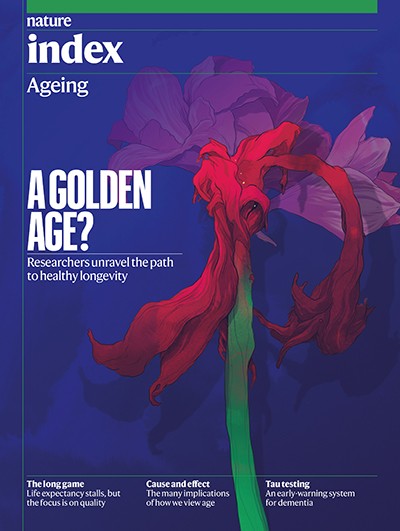
Credit: Simon Prades
The study of ageing has shifted from a niche pursuit to a major area of research. Over the past two decades, scientists have flooded the field, determined to unlock the secret to a longer, healthier life. “Various people have started to think we could intervene in the ageing process and extend lifespan. [The field] has really exploded because of that view,” says Alan Cohen, a biologist at Columbia University in New York City.
But even as interest grows, scientists have yet to reach consensus on fundamental concepts in biological ageing, Cohen says. There is no widespread agreement on what ageing is or when it begins, or what the goal should be in investigating it. “There are people like me who think we can’t intervene — and even if we could, we shouldn’t — to people at the far end of the extreme who say we should make humans immortal and every moment we delay is equivalent to murder,” Cohen says. “Serious scientists are at every point along that spectrum.”
Nature Index 2025 Ageing
A key contention is whether ageing should be considered a disease. As Richard Faragher, a biogerontologist at the University of Brighton, UK, puts it, if a disease is defined as something abnormal, then ageing does not count. But if a disease is defined as something that is preventable, treatable and able to be slowed down, then ageing is a disease.
Scientists, doctors and philosophers have pondered this question for centuries, but as more countries confront the realities of an ageing population, the debate has taken on new urgency, and it has the potential to influence everything from the direction of research to how older people are treated in society. “This is the early phase of an incredibly rapidly growing field,” says John Beard, an epidemiologist at Columbia University. “I think people are open to thinking about it in new ways, if a new way makes sense.”
Is ageing a disease?
The concept of what is and isn’t a disease has changed over time. For example, before the 1960s, developing high blood pressure in older age was not considered a problem, says Faragher. “Now, we know that your blood pressure going through the roof is not benign.” Crucially, he adds, labelling high blood pressure, or hypertension, as a disease brought both funding and research attention to find treatments for it. “Things only start to get studied when they become problems.”
Some people like to think of ageing as “a kind of optimal, almost benign decline” with certain diseases overlaid, says Faragher. But he and some other researchers argue that this oversimplifies things, that ageing and disease aren’t necessarily separate, and that treating them as such can hold back progress on understanding and managing the process. Ageing “is inseparable from pathology”, says Faragher. He points to senescent cells — damaged cells that behave in harmful ways and accumulate with age — which not only contribute to conditions such as heart disease, osteoporosis and cognitive impairment, but are also linked to hallmarks of ageing such as grey hair and wrinkles. In animal studies1, deleting these cells leads to “dramatic increases” in health and lifespan, Faragher says, which suggests that this aspect of ageing “is both treatable and reversible”.
James Pacala, an academic geriatrician at the University of Minnesota in Minneapolis, says that for some researchers, the ideal scenario in ageing science is to find “some common cellular and molecular denominator that leads to all of the declines we see with ageing”. Cohen says it’s unlikely, however, that a single cause could explain ageing, because millions of factors probably contribute to the body gradually losing its ability to stay organized and function properly. Faragher agrees that there probably isn’t one single mechanism of ageing, but that there is a small set of key mechanisms — such as a build-up of senescent cells — that act together as a loose network and cause many age-related diseases as well as ageing itself.
If ageing were to be categorized as a disease, it would probably cause the biggest ripples not in laboratories, but in the regulatory and funding support that those labs receive, says Ming Guo, director of the Aging Center at the University of Southern California, Los Angeles. “It would be a paradigm shift,” she says.
This would be especially true in places such as the United States, where federal science agencies and drug-approval bodies tend to focus on diseases that produce clear, measurable results, such as improvements in symptoms. Declaring ageing a disease “would unleash a lot of research funding, facilitate drug development and ultimately lead to faster approval of the geroprotective therapies”, Guo says.
Faragher agrees that the ‘disease’ label would expedite solutions. “I think the question is more along the lines of ‘Do you want to do something about these problems or not?’” he says. “If ageing is a disease, then you’ve decided it’s worth doing something about it.”
The case against
Some scientists argue that the way ageing is discussed in research has major ethical implications. ‘Old age’ nearly became an official disease in 2022, when the International Classification of Diseases (ICD) — a global catalogue of known human diseases — sought to give it a diagnostic code in its latest revision2. Some doctors and scientists pushed back, however, which ultimately led the World Health Organization (WHO), the ICD’s publisher, to withdraw the listing. “The WHO retracted it based on the science — and on the unintended ethical, moral and social consequences,” says Kiran Rabheru, a geriatric psychiatrist at the University of Ottawa in Canada.
For one thing, calling ageing a disease could negatively change people’s view of their agency over the process, says Sundeep Khosla, an endocrinologist who studies ageing at the Mayo Clinic in Rochester, Minnesota. “From a patient’s perspective, it leads to a mindset of ‘Well, I need a drug to cure the disease’,” he says. “It perhaps shifts focus away from what should remain the major intervention: lifestyle.”
Ageism is another concern. If ageing is classified as a disease, then anyone over 60 or 65 (or whatever cut-off was chosen) would be considered ‘diseased people’, Guo says. Half of the world’s population is already ageist, according to a 2021 WHO report on the issue of ageism3 (see ‘Ageism attitudes’) so categorizing older people as diseased would only add to that stigma, Rabheru says.
Some researchers argue that it doesn’t make sense, biologically, to call ageing a disease. Because although ageing increases the risk of most chronic diseases, “you either have a disease or you don’t — and who doesn’t have ageing?” says Beard.
The tendency to think of ageing as a disease reflects what Beard describes as an “outdated way of thinking” — one that focuses too narrowly on individual problems and their specific biological causes. For example, the fact that the immune system naturally weakens with age doesn’t just impact the heart, as previously thought, but seems to increase arthritis4 and dementia5 risk, too. “We now understand from geoscience that age-related biological change simultaneously increases the risk of almost all chronic conditions,” says Beard.
Future outcomes
For some, the debate over whether ageing should be classified as a disease is growing tiresome. “At major international meetings, after people have a second beer, this topic comes up over and over and over again,” says Richard Miller, a biogerontologist at the University of Michigan in Ann Arbor. “I walk away from those discussions.”
There seems to be a strong cultural element to the debate, says Cohen, and points out that it’s mostly being carried out by researchers in North America and Europe. Joe Poh Sheng Yeong, director of immunopathology at Singapore General Hospital, agrees, noting that in Asia, many governments and societies are more focused on dealing with the real-world pressures of ageing populations rather than getting caught up in the semantics.
Beard adds that the push to label ageing as a disease is likely to be strongest in countries where research funding is tied to disease-based categories, and where health-care systems pay doctors and hospitals for each test, procedure or treatment they perform. This creates more incentive to classify ageing as a medical problem, because it opens up more opportunities for billable services.



